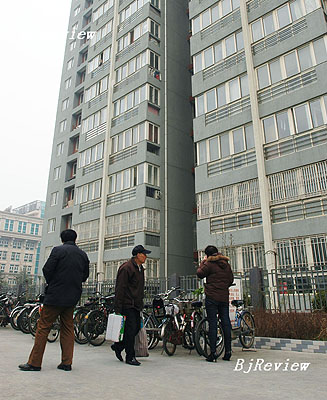 |
|
AFFORDABLE: Residents park their bicycles outside Beijing's only low-rent housing community (WEI YAO) |
The 81-year-old Wu Wantong moved to his current home in downtown Beijing in February 2004, a brand new complex of three 14-storey buildings on the second ring road. He is living with his youngest daughter and an adolescent granddaughter in a 60-square-meter two-bedroom apartment on the 13th floor.
Compared with Wu's old life when he lived with a three-person family including his son in a 26-square-meter two-room apartment provided by the furniture factory he used to work for, his new life is much better. The community he lives in is clean and its gardens are well kept. There is also a clinic on site offering basic medical care to the residents. On sunny days, Wu enjoys walking around the community and chatting with his new neighbors, who are mostly senior citizens. Every month Wu pays a little over 110 yuan in rent. In a condo project next to Wu's community, completed in the same year, the monthly rent for a similar-sized apartment is around 3,500 yuan, which almost equals Wu's monthly pension, his only income.
The community Wu lives in is Beijing's only community of low-rent housing. The local government has claimed that the city will build 300,000 square-meters of low-rent housing by the end of this year to improve the living conditions of 6,000 households, which will be scattered among existing communities. The government has also promised to purchase second-hand housing to provide as low rent accommodation for Beijing's urban poor. According the website of Beijing's Municipal Government, since the city initiated its low-rent housing scheme in 2001, it has provided low-rent housing for 5,170 households and housing rent subsidies for more than 23,000 families. The new policy of transferring land leasing fees to low-rent housing programs has boosted the fund to 3.4 billon yuan.
In 1998, the State Council drafted a guideline on providing housing for different types of families. It said that poor families would be provided with low-rent housing; low-income and below-medium-income families would be able to purchase government-subsidized affordable housing; and wealthy families would have to buy property at the market price. In the same year, Beijing launched an affordable housing program for households with an annual income below 60,000 yuan. While the program was designed to provide decent housing for Beijing's lower income families, it largely failed. The 60,000 yuan qualification level meant that most-around 90 percent-of Beijing households were eligible for the program, and developers concentrated almost entirely on the wealthiest of eligible families. It meant that most of the so-called affordable housing was still out of the reach of almost all of Beijing's residents.
As a result, a large number of households in Beijing can neither afford "affordable housing" nor qualify for government housing subsidies. To help this group of people the local government has begun to widen housing subsidy coverage from households receiving subsistence allowance to all households with per-capita monthly income below 580 yuan and a housing area of less than 7.5 square meters.
"Affordable housing in Beijing has failed to make housing affordable to low-income families and instead caused losses of government money," said He Ping, a professor at the School of Finance at Renmin University of China. "The key to solving the problem lies in government providing more housing for low-income families to rent."
Beijing's dilemma
Unlike many other cities around the world, Beijing lacks large areas of government-subsidized housing. This is largely a result of the city's real estate market.
Although the property market has been booming in recent years, housing was not considered a commodity three decades ago. Before China's urban housing reform that started in the early 1980s most of China's urban population lived in housing provided or heavily subsidized by work units as an in-kind payment for their work.
| 